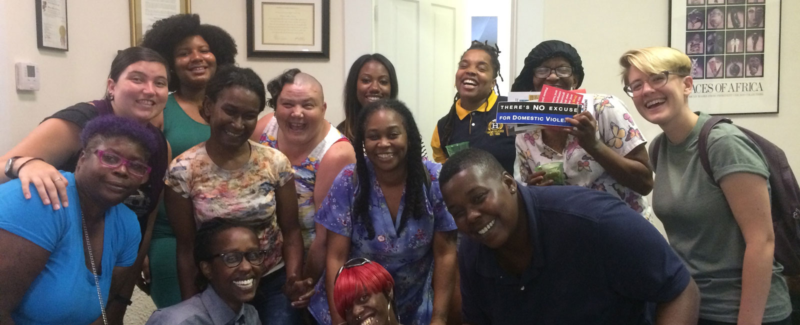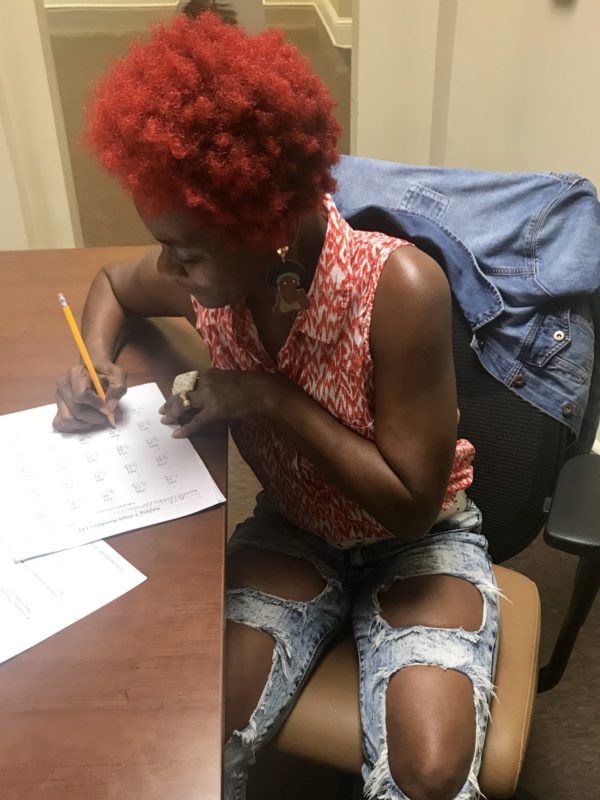Editors Note: The following series “Women Making History” is a week-long series curated by Marisa Long as part of the Digital Research Internship Program in partnership with ViaNolaVie. The DRI Program is a Newcomb Insitute technology initiative for undergraduate students combining technology skillsets, feminist leadership, and the digital humanities. You can read Marisa’s full introduction on this series here.
As we reach the last week of Women’s History Month, I wanted to take some time to celebrate women who have made history in New Orleans and women who continue to make history today. This curation of articles is designed to highlight several of these women and to honor all women who have helped to shape New Orleans into the cultural center we know and love whether through art, reform, or entrepreneurship. Although gone are the times when every woman had to fight for their right to an education in America, still not all women are able to enjoy this luxury. Writer Jasmine Davidson presents the Women FIRST Clinic and how it is changing the scene of education for women affected by incarceration in Louisiana. Here’s their story, which was originally published on December 28, 2017.
It was 6:00 PM on a Thursday night. In a small, brightly lit room, a group of women gathered around a table. Their voices echoed down the hall as their teacher, Eliza McDermott, discussed her lesson plans for the evening. There was a variety of women seated at the table, some young, some old, but one quality united them all: a longing for a bright future and a fresh start.
This group is known as the Women FIRST (Formerly Incarcerated Returning Students Team) Clinic, an extension of the Louisiana Prison Education Coalition (LPEC).

Women FIRST Clinic members and administrators
LPEC was founded in 2015 through a partnership between Annie Freitas, Tulane Ph.D student;
Rhiannon Dowling, U.C. Berkeley Ph.D student; and Voice of the Experienced (V.O.T.E). The organization strives to increase the educational opportunities of those currently incarcerated in Louisiana, and it provides access to educational programs for anyone impacted by the prison system. These educational programs include Inside Voices NOLA, a creative writing class and publication for incarcerated writers; the Orleans Justice Center, a HiSET (GED) class for women at the Orleans Justice Center (formerly Orleans Parish Prison); an upcoming college-level writing course for women at the Louisiana Correctional Institution for Women; and the Women FIRST Clinic.
The Women FIRST Clinic is a program focused on helping women who were formerly incarcerated achieve their educational goals. The program was created through a partnership between Women With a Vision and LPEC. It was funded by the Criminal Justice Initiative, a group of community organizers, activists, and donors that provides grants to grassroots organizations to end mass criminalization, incarceration, and state violence.
The clinic debuted as a 10-week pilot session during the summer of 2016. At the time, it met once a week and had 10 students. Every meeting began with dinner, followed by a discussion of relevant, social issues, and lastly one-on-one tutoring. The clinic also provided transportation, childcare, and mentorship opportunities for its members.

Women FIRST Clinic meeting
In a brief interview, Sade Dumas, the coordinator of the Women FIRST Clinic, stated that the pilot session was a success because it was a safe space for the women to discuss the intersectional nature of criminal justice. Intersectionality is the theory that social identities like race, class, and gender overlap and promote systems of discrimination. Dumas stressed that anyone affected by the prison system who identifies as a woman is welcomed at the clinic. This is the goal of the Women FIRST Clinic: justice for all women.
“If you’re not fighting for justice with an intersectional lens, then you’re doing it all wrong,” Dumas insists. “If you’re leaving someone out, you’re doing it all wrong.”
The current session of the Women FIRST Clinic, which started this past July, is structured similarly to the pilot. Currently a year-round program, the clinic meets every Tuesday and Thursday from 5:30 PM to 7:00 PM. Each meeting begins with a main lesson. Afterward, the teacher caters to the students’ educational backgrounds through personalized tutoring. According to Dumas, individual tutoring allows close relationships to form between the tutors and students, and it makes the program a valuable and unique experience for its participants.
Peggy Davis is one example of how the Women FIRST Clinic is helping its members achieve their educational goals. In May 1982, Davis should have been celebrating her high school graduation, surrounded by her peers and hopeful for the future. Instead, she was forced to put her education on hold after the birth of her daughters. Every time Davis attempted to pursue an education, obstacles like the death of her oldest daughter and the incarceration of her middle one continued to knock her off her feet. Despite the hardships, her desire for an education, and ultimately a second chance, never died.
This past July, Davis heard about the Women FIRST Clinic while at a different meeting in the same building. Intrigued by the concept, she decided to attend a session. Presently, she continues to go to the clinic and brings her daughter, Trellis, who receives tutoring for the HiSET. When asked what she likes most about the program, Davis said that she enjoyed the pace of the curriculum and the one-on-one tutoring.
“I like coming here,” she admits happily. “I look forward to it. Yep, I wouldn’t give it up for
nothing.”
After the clinic, Davis plans to attend culinary school and learn how to cook “those fancy meals
that be on TV.” Her dream is to someday open a restaurant in New Orleans.

Student at the Women FIRST Clinic works diligently on her coursework.
Like Davis, there are many women who have goals and ambitions that could not be attained without the educational opportunities provided by the Women FIRST Clinic. The mere fact that these women were formerly incarcerated often hinders them from finding jobs and leading meaningful and successful lives. This stigma is what the Women FIRST Clinic fights against. By providing the opportunity to pursue an education, the clinic offers its members a chance at a new life and a fresh start.
“Our goal is to work ourselves out of jobs. We don’t want to do this long term,” Dumas states, reflecting on the memory of a previous student who currently holds an administrative position in the organization. “We want to help people and empower people, so that they can reach back and help others.”
 NOLAbeings
Multimedia artist Claire Bangser created NOLAbeings as a portrait-based story project that marries...
NOLAbeings
Multimedia artist Claire Bangser created NOLAbeings as a portrait-based story project that marries...
 Data corner: Adobe Suite (create a PDF, social media graphic, presentation, edit a photo and video
Data corner is where you go to work with analytics and top tech skills. It takes on everything from PERL and SQL to Canva and Sprout Social.
Data corner: Adobe Suite (create a PDF, social media graphic, presentation, edit a photo and video
Data corner is where you go to work with analytics and top tech skills. It takes on everything from PERL and SQL to Canva and Sprout Social.
